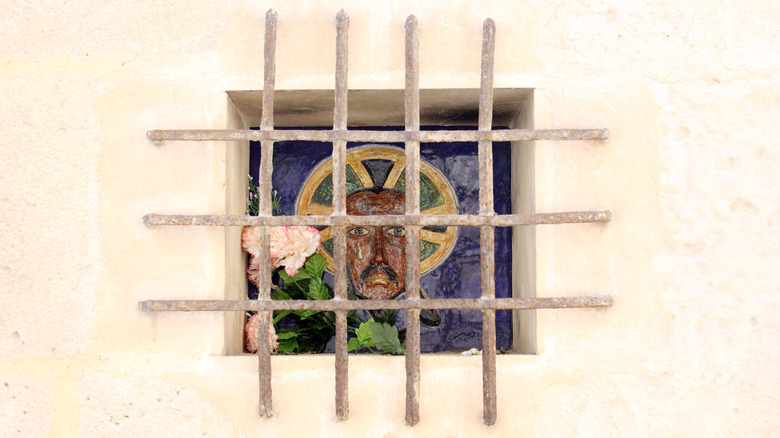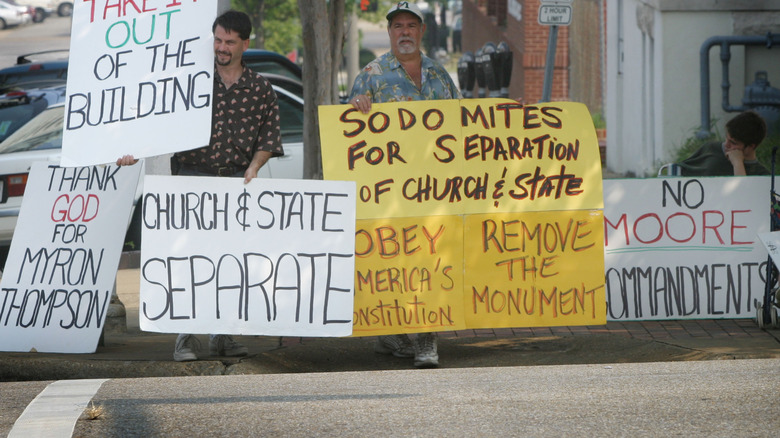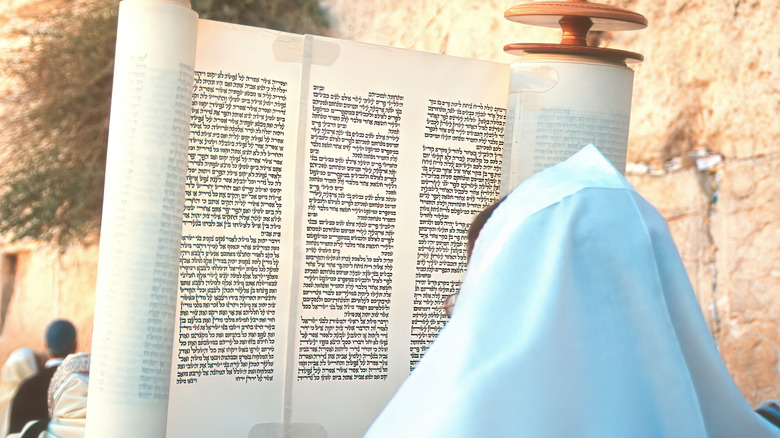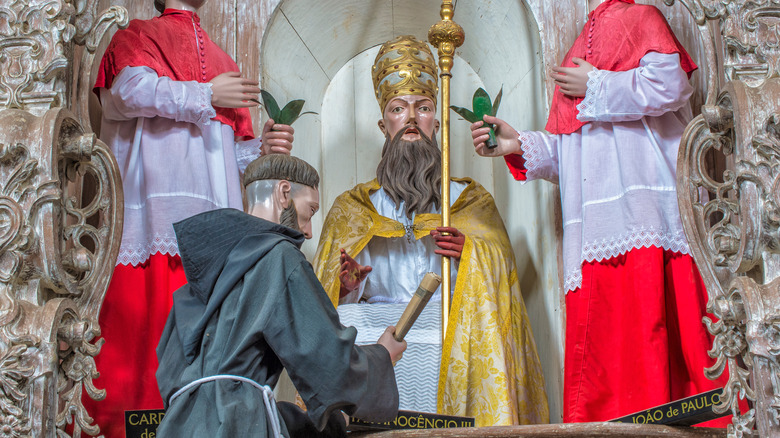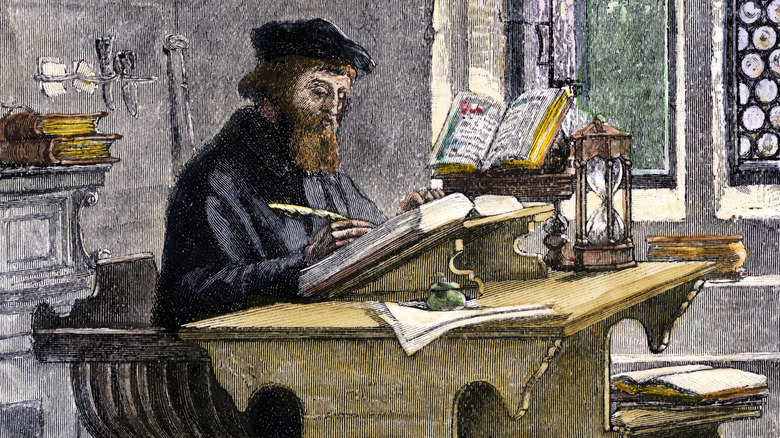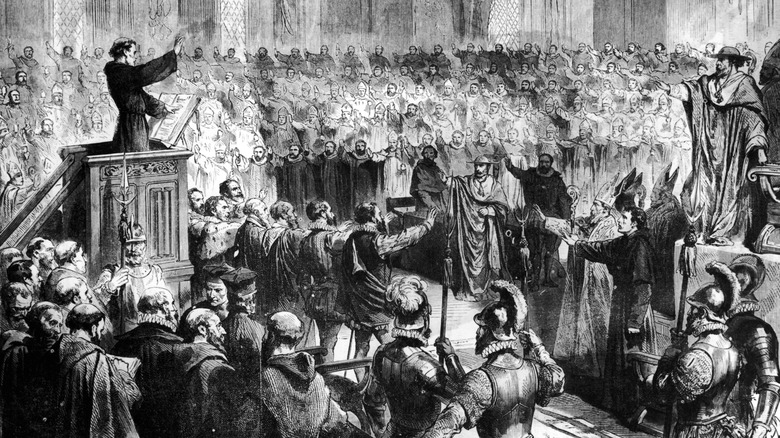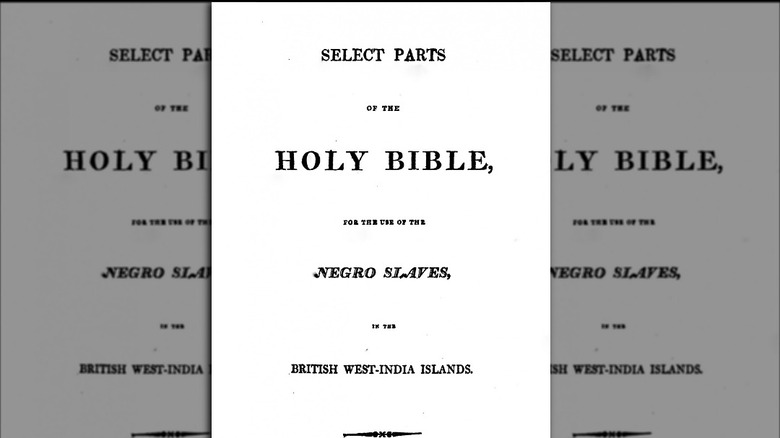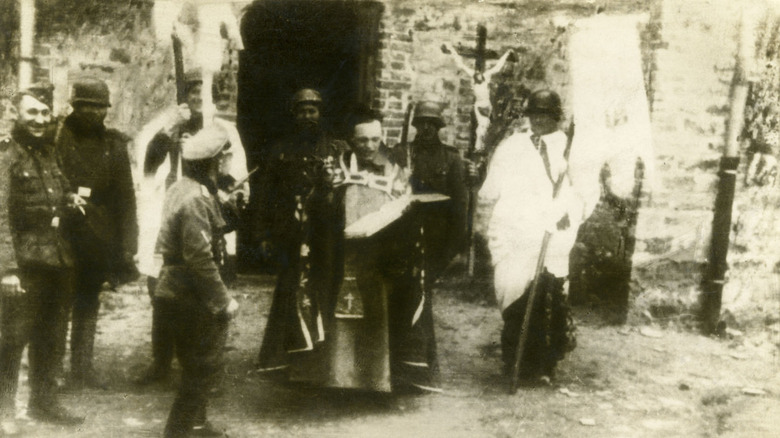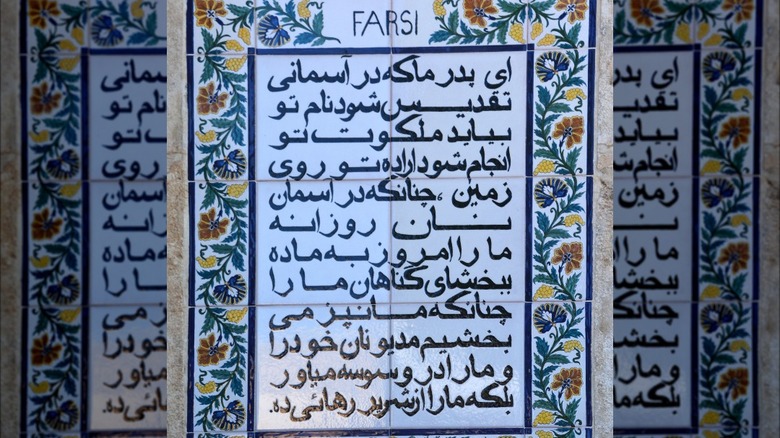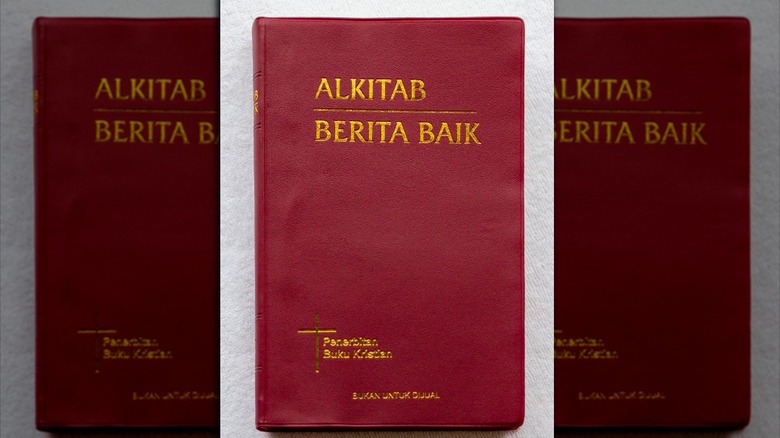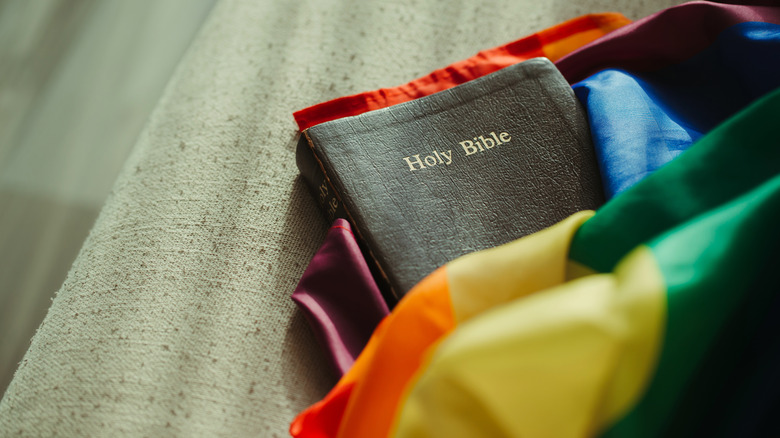Times The Bible Has Been Censored And Why
The Bible, the collection of Christianity's sacred texts, has been both loved and reviled since its compilation in the first century A.D. The book has subsequently been restricted, redacted, and even banned to prevent people from reading it. It may seem logical to think that the primary cause of such actions is anti-Christian bias. In modern times, this is certainly true, especially in countries where Christians face overt persecution. But in the past, the causes of Bible censorship and the identities of its enforcers were diverse and often surprising.
Jews and Christians alike have censored parts of their own scriptures in a myriad of ways for just as many reasons. Translation, ownership, and study of the Bible have been restricted in the Christian world, exacerbated by the Catholic-Protestant divide. Read on to learn about some of the occasions in which the Bible has been censored, some of them predictable, others less so, and a few just downright bizarre.
Modern background to censorship
In 2015, the American Library Association (ALA)'s Office for Intellectual Freedom released its list of the most challenged books. The sixth entry stunned many onlookers. It was none other than the Bible, Christianity's sacred text. So how did the Bible end up on a list of books that were requested to be banned from American libraries? Some suggested it stemmed from a growing hostility to Christianity. But the ALA disputed that claim.
According to HuffPo, the ALA reported that the Bible was frequently challenged (that is, the ALA received a formal complaint about it) for its sexual content and incitement to violence. Some critics have complained that a taxpayer-funded institution carrying the Bible is a violation of separation of church and state, although many libraries carry plenty of other religious literature (some of which have also been challenged). While there is no way to tell for certain if there is an anti-Christian bias, sociologist Ryan Cragun (via HuffPo) noted that the hostility probably originates in a secularist attack on all perceived public displays of religion, a phenomenon observed in other instances, such as protests against public displays of the Ten Commandments.
It started with Judaism
Judaism gave the world the texts of the Bible. Both the New and Old Testament were written for Jews by people who considered themselves Jews. Thus, it is surprising that Judaism has a set of rules for censoring parts of the Torah in certain contexts. According to the Jewish Telegraphic Agency, to embarrass someone is to murder him. But the Torah is full of situations that are embarrassing to Judaism's revered figures, such as Moses, David, Saul, and many others. Some even embarrass the Jewish people as a whole. But scripture must still be read in the synagogue.
Fortunately for Jews, the Talmud provides a solution. Tractate Megillah 4:10 says that if an incident in the Torah is problematic, simply don't read it in the synagogue. If it is really embarrassing, then not only should it not be read in the synagogue, it should not even be translated out of Hebrew. Now, as the Jewish Telegraphic Agency notes, this censorship is purely contextual and applies only within the synagogue. Jews should still read these stories on their own time and learn from them. This seems like a fair compromise. Important figures and Jews themselves are not publicly embarrassed, but Jews today can still learn from their examples to avoid repeating their errors.
Medieval Catholic censorship
A common Protestant claim accuses the Catholic Church of denying the medieval common person access to the Bible. This accusation is perhaps moot because most people were illiterate, but the Catholic Church never passed a blanket ban on the Bible. However, Catholic officials did prohibit possession of the Bible under certain circumstances, with the goal of preserving doctrinal unity among the faithful.
There are numerous instances, including two that typify the circumstances of Bible bans. Usually, private reading and interpretation of the Bible was banned to preempt heretical movements and the social upheaval they caused. In 1199, Pope Innocent III, according to the National Catholic Register, allegedly banned the Bible. However, as the same source notes, this is inaccurate. Pope Innocent actually commended the desire to read and study the Bible. But, he noted, unschooled, private Bible study would inevitably lead to heresy. Therefore, he banned private Bible study groups, but not the book itself.
While Pope Innocent did not forbid possession of the Bible, the 1229 Council of Toulouse did. The council ruled that lay people were forbidden from possessing any books of the Old or New Testaments. Laity could still access scripture, as psalters containing psalms were exempted from the ban. So were breviaries, which contained Bible readings that were read at Mass. But these were not considered problematic, perhaps because in isolation, one would require a priest to explain the text.
'That pestilent wretch of damnable memory!'
Although vernacular Bible translation is associated most commonly with Martin Luther, there were other versions that pre-dated Luther during the Middle Ages (including these Spanish and Czech versions). In English, the Bible first appeared in the late 14th century, thanks to a reformer named John Wycliffe. His resounding success led the Catholic Church to censor him, his translation, and any future ones.
Wycliffe was quite an enemy. According to Christianity Today, he managed to earn himself the title of "master of errors," have five separate papal statements against him, and be burned as a heretic after he was already dead. He also believed, like Luther, that ordinary people should study the scriptures in their own languages, and produced a partial English translation of the Bible. This was yet another high crime.
According to "History of the Christian Church," Wycliffe's crime earned him several new titles. The Archbishop of Canterbury, Thomas Arundel, declared him a "pestilent wretch of damnable memory, yea, the forerunner and disciple of anti-christ who, as the complement of his wickedness, invented a new translation of the Scriptures into his mother-tongue." According to History Today, Wycliffe went further and denied the doctrine of transubstantiation, but was never formally tried for heresy. He died of a stroke in 1384.
After Wycliffe's death, the English church cracked down on Wycliffe's would-be imitators. The Synod of Oxford in 1407 threatened translators with excommunication. A 1414 law threatened seizure of property for reading English scriptures. Thus did the English church seek to censor and destroy any attempt to disseminate the Bible in vernacular languages.
The papacy takes control
According to History, the 1490 invention of the printing press resulted in increased literacy and availability of books. During the Reformation, one of these books was the Bible, which Martin Luther, among others, translated into German in 1534. With the Bible widely available, the Papacy could not simply censor or forbid it anymore. So the Council of Trent decided to co-opt the translators instead.
According to Patheos, the Council of Trent did not outright ban vernacular Bibles, a common accusation against the Catholic Church. In fact, accusations flew both ways, as Protestants attacked Catholic vernacular translations when they opposed Protestant doctrines. Instead, the council made the Latin Vulgate the standard Catholic Bible. All translations of it and certain other books had to receive papal approval following a list of rules. In practice, this banned Protestant Bibles, which the Catholic Church considered wrong at best, heretical at worst.
At best, one can argue that the Council of Trent's decision constituted a de facto ban on Bible reading for many. According to the Sorbonne, Latin was an elite language. Therefore the Vulgate was inaccessible to the average person, who did not know Latin. Ultimately, this is a moot point. According to the USCCB, the Catholic Church discouraged private Bible study. Thus Bible reading and study as is common today was the "hallmark of a Protestant." Only in 1943 did Pius XII reverse the church's position and encourage Catholics to read Catholic-approved Bibles on their own.
Is Bible-burning okay? Depends on the version
One way to censor a text is to simply destroy it. If it doesn't exist, no one can read it. According to the Times-Picayune of New Orleans, when the (Protestant) Bible Society distributed Bibles to Champlain, New York's Catholic population in 1842-43, one Catholic priest ensured that his flock would not read them. Today such actions would likely not catch much attention. Christians all agree that the Bible is scripture and should be treated as such regardless of the version, right? Not quite, since Protestant and Catholic Bibles are distinguishable from the number of books (66 vs. 73).
Fr. Telman (also spelled Telmont), a French priest visiting Champlain, was not pleased. It seems that the Protestant Bibles were not worthy of respect in Telman's opinion because according to 19th century pastor John Dowling's "The History of Romanism," he burned a number of them publicly. Telman's actions caused some outrage among the townspeople, but overall, the Times-Picayune noted that their reaction was measured. Instead of turning against the Catholic community, whom the town called "neighbors and friends," local authorities investigated the incident and concluded that Telman had acted alone. The Bishop of Montreal, Telman's superior, also expressed regret and the incident passed.
Slave? No Old Testament for you!
Although Protestants criticized Catholics regarding Bible reading among the laity, Protestant slave owners in the Caribbean engaged in even more blatant censorship. According to NPR, British missionaries seeking to educate slaves redacted the text at the request of planters. The title of the redacted edition, "Parts of the Holy Bible, selected for the use of the Negro Slaves, in the British West-India Islands" from 1807, says it all. British missionaries emphasized sections of the Bible that depicted slavery as an acceptable practice at the expense of books that called for human dignity and freedom from slavery.
According to Museum of the Bible curator Anthony Schmidt (via NPR), the slave Bible was missing around half of the New Testament and a jaw-dropping 90% of the Old Testament. Of 1,189 total Bible chapters, only 232 were included. Why? Parts of the New Testament, such as Galatians 3:28, emphasized the equality of all Christians before God and within the Christian community. Exodus, which told the story of the Israelites escaping Egyptian slavery was cut too. The story of Joseph's enslavement, however, was kept.
So why such blatant censorship? History notes that this slave Bible was published a mere three years after the end of the Haitian Revolution in 1804. This slave rebellion had seen the massacre of the French planter aristocracy. British slave owners were determined to avoid a repeat in the British West Indies. So, anything Biblical that might encourage a slave rebellion was to be censored.
The Aryan Jesus
Unlike its Soviet archenemy, which tried to crush Christianity by force, Nazi Germany tried to eliminate Christianity by co-opting it. A 1933 New York Times article claimed that German chancellor Adolf Hitler planned to create a state church whose Bible would be harmonized with Nazi ideology. Germanic legends and sagas would replace the Jewish Old Testament. Although this vision never came to full fruition, the Nazis vigorously redacted the Bible to mold Christianity to their liking.
According to the Daily Mail, a redacted German Bible illustrates Nazi attempts to rewrite and de-judaize the book. The Ten Commandments were replaced with maxims emphasizing among other things, racial purity, duty to Germany and the Nazi Party, and loyalty to Hitler. Borrowed Hebrew words such as "hallelujah" and "hosanna" were banned too. Thus, the Old Testament was not completely removed, although that had been the plan. According to Time, Dr. Alfred Rosenberg, the architect of Nazi racial policies, even proposed replacing biblical figures with pagan gods and offered Germany's 2,000,000 dead from World War I as replacements for the Catholic community of saints.
Despite the attempt to nazify Christianity, it was ultimately a con. Hitler's goal, as Time attests, was the replacement of Christianity with a hybrid nationalist-pagan cult of the state. Hitler and other Nazi ideologues exhorted Germans to reject Judeo-Christian doctrines, those teachings of "alien priests" that they deemed a threat to Germany's future existence and brought the state into conflict with Catholicism and Protestantism alike.
The Bagram Bible burning
The United States is not a country necessarily associated with religious censorship. But the military plays by different rules. In 2009, Al Jazeera reported that military chaplains at Bagram Air Base in Afghanistan planned to distribute Dari and Pashto Bibles to Afghans. This was a potential PR disaster, since conversion from Islam in Afghanistan is a capital offense. According to Fox News, the U.S. military quickly squelched the plan, in accordance with its ban on proselytism, but also burned the Bibles. Lt. Col. Mark Wright (via CNN) referred to the action as troops "burn[ing] their trash" in accordance with military rules. They were not sent back for fear that the distributor would simply resend them to Afghanistan.
Conservative magazine First Things bemoaned what effectively amounted to government censorship and desecration of the Bible, contrary to American values of religious freedom and free expression. Burning the Bibles was unnecessary, and according to Fox, the military could have returned them to the United States. Neither the Bush or Obama administrations issued any statement, apology, or condemnation. Instead, according to the National Catholic Register, the Obama administration apologized for a separate Quran-burning incident, infuriating American Christians for the administration's apparent double-standard.
Malaysia censors the word Allah
Despite the Bagram incident, biblical censorship is relatively rare in the U.S. But elsewhere, censorship of the Bible is alive and well, especially in countries where Christians face restrictions or persecution. One of the more interesting cases took place in Malaysia, where Christians, despite having the right to worship, have encountered government censorship of their Bible translations. In 2014, the BBC reported that the Malaysian government confiscated 300 Bibles from the country's Christian minority. The crime? The Bible Society had translated the word "God" as "Allah." Malaysia's court of appeals ruled that "Allah" was an exclusively Muslim term and its use by Christians would cause civil unrest. This was the second incident of its sort after a Catholic newspaper was charged for a similar offence.
The Malaysian Bible Society accused the government of overstepping its authority and violating the religious freedom provisions of the constitution, including revoking publishing credentials for anyone using "Allah" in non-Muslim contexts. Malaysia's Christians appealed the ruling. According to the BBC, Malaysia's High Court ruled in their favor in 2021 and buried the issue. Why all the fuss? As usual, it was probably politics to deflect from the Malaysian government's poor performance. Virtually everywhere else in the Muslim world, this is a non-issue. According to the Christian Research Institute, Arab Christians call God "Allah," since the word literally means "God." Thus, it seems strange that Malaysia would have issues with use of the word unless there were a political backdrop to the issue.
A reading from the Holy Gospel according to Xi
Malaysia's 2014 censorship of the Bible was petty, but it was overturned and did not affect the text's overall integrity. Biblical censorship in China, however, is another story. According to the Wall Street Journal, Chinese premier Xi Jinping has proposed a rewriting of the Bible to harmonize it with the ideology of the Chinese Communist Party and Chinese culture. Now, China has been a persecutor of religion for some time. The state is officially atheist and according to the Family Research Council, strictly regulates the sale of Bibles and distribution of Christian literature within its borders. Chinese police regularly destroy Christian books and Christians have even been thrown into camps according to Radio Free Asia. But the Economist notes that despite the pressure, Christianity continues to boom in China. Therefore, Xi Jinping has abandoned earlier attempts to eradicate the religion and decided to co-opt it instead.
The Jerusalem Post reports that China considers the Bible too "westernized." Thus, the CCP under Xi has commissioned a rewriting of the Old Testament and reinterpretation of the New Testament to introduce Buddhist, Confucian, and socialist values into the text. Although there are no excerpts available so far, a Chinese ethics textbook hints at what kind of changes are in the pipeline. The Family Research Council notes that the state-approved text changes the Gospel of John to have Jesus stone the adulteress instead of saving her. In this light, who knows what distortions the official version will contain.
The Bible but 'hella gay'
Most of the above incidents are serious cases of Bible censorship that have been aimed at preventing people from reading the Bible independently, for whatever reason. But there is always a more amusing episode of censorship. In 2017, Pride Magazine reported that gay comedian Elijah Daniel decided he was going to publish his own "hella gay," translation of the Bible to troll his detractors and "the straights."
Daniel's version made changes to particular parts of the Bible to make them "gayer." He replaced God with Rihanna. Satan became Donald Trump. Adam and Eve became Adam and Steve. In the Bible, Jesus turned water to wine. In Daniel's version, he turned water into mimosas. Daniel's stunt was his latest after becoming the mayor of Hell, Michigan, and banning all heterosexuals from the town. But his Bible stunt would not be taken nearly as kindly.
Daniel's version became the bestselling Bible on Amazon, and as one can imagine, Christians were not happy. Amazon responded by banning the book. The company never released a statement explaining its reasoning, but according to Patheos, it reinstated the book shortly after. Does this count as biblical censorship? If it does, it sure is a case stranger than fiction.
